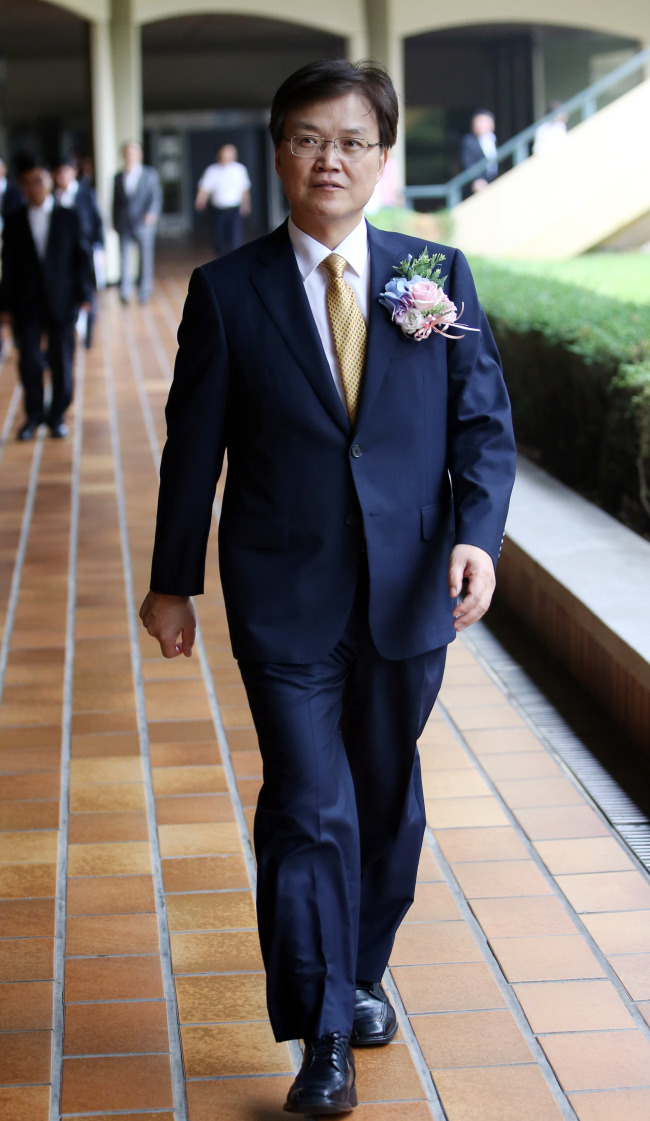Choi Yang-hee took office as South Korea’s minister of science, ICT and future planning on Wednesday after days of grilling by the political parties regarding his alleged real estate irregularities.
The new minister faces a slew of policy issues to mend, resolve and carry out to meet expectations not only of the people and businesses, but also those of the president, who envisioned the ministry to play the lead role in finding the next big technological innovation.
His most urgent priority is fine-tuning the concept and realizing the development of a “creative economy,” a term that people are still perplexed about after many government officials came out with their own explanations, industry sources said.
While agencies such as the Ministry of Strategy and Finance took most of the spotlight by emphasizing that “creative economy” means creating a market ecosystem allowing entrepreneurs to secure capital, the ICT Ministry was left in the dark.
The new minister faces a slew of policy issues to mend, resolve and carry out to meet expectations not only of the people and businesses, but also those of the president, who envisioned the ministry to play the lead role in finding the next big technological innovation.
His most urgent priority is fine-tuning the concept and realizing the development of a “creative economy,” a term that people are still perplexed about after many government officials came out with their own explanations, industry sources said.
While agencies such as the Ministry of Strategy and Finance took most of the spotlight by emphasizing that “creative economy” means creating a market ecosystem allowing entrepreneurs to secure capital, the ICT Ministry was left in the dark.

Choi summed it up as encouraging people to be creative and be challenging; promoting technological convergence to discover new business opportunities; and having software play a central part in the development.
“I will make efforts to (realize this) to a point at which other economies will benchmark Korea’s creative economy in 10 years,” Choi said during his inauguration at the government complex in Gwacheon, Gyeonggi Province.
His ambitions ran as high as Korea achieving per capita income of $40,000 by pushing innovation at state-funded research centers and colleges, and having the private sector participate more in discovering and developing the country’s next growth engine.
Other immense tasks for the ministry include narrowing the differences between broadcasting and telecom companies over the allocation of 700-megahertz spectrum for new media such as ultrahigh-definition content, sources said.
This would require the ministry to negotiate with the Korea Communications Commission as the two agencies remain divided, with the ministry seemingly siding with the telecom industry and the KCC with broadcasters.
The ministry will also have to further clean up the mobile communication market, in which telecom companies have been tussling over irregular pricing and subsidies, and make it more consumer-friendly, as Choi pledged during his confirmation hearing.
Securing a budget for the landmark ITU conference in Busan later this year by gaining approval from the Ministry of Finance, with which the ICT Ministry still needs to negotiate, remains a daunting task as well amid a tax revenue shortage and increased welfare spending.
By Park Hyong-ki (hkp@heraldcorp.com)






![[KH Explains] Can tech firms' AI alliances take on Nvidia?](http://res.heraldm.com/phpwas/restmb_idxmake.php?idx=644&simg=/content/image/2024/05/07/20240507050619_0.jpg&u=)


![[Grace Kao, Meera Choi] Has money displaced romance on dates?](http://res.heraldm.com/phpwas/restmb_idxmake.php?idx=644&simg=/content/image/2024/05/06/20240506050233_0.jpg&u=)







![[K-pop’s dilemma] Time, profit pressures work against originality](http://res.heraldm.com/phpwas/restmb_idxmake.php?idx=652&simg=/content/image/2024/05/08/20240508050705_0.jpg&u=20240508171126)
![[Today’s K-pop] NCT Dream to drop pre-release from 2nd Japan single](http://res.heraldm.com/phpwas/restmb_idxmake.php?idx=642&simg=/content/image/2024/05/08/20240508050725_0.jpg&u=)